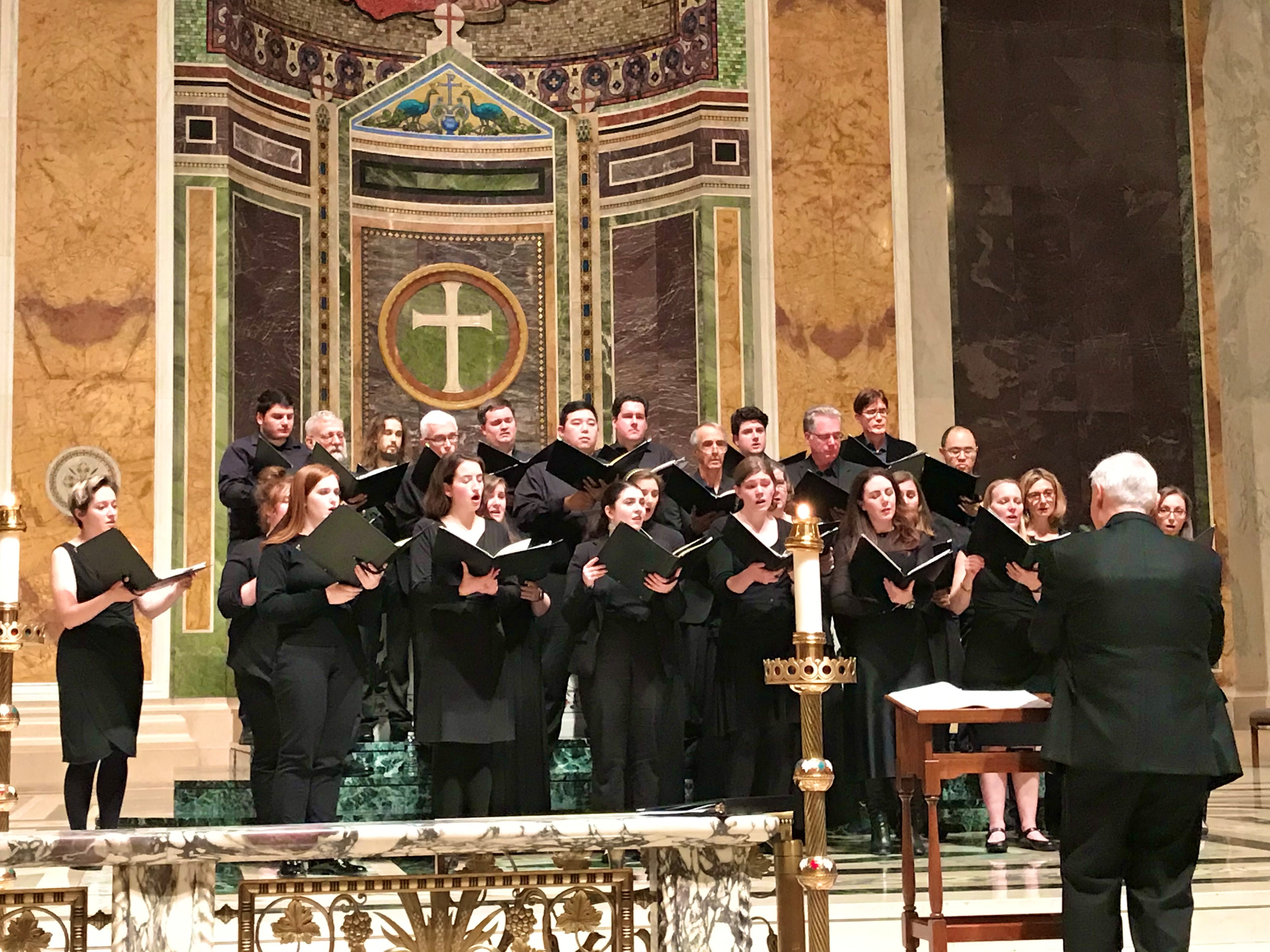The Most Holy Body and Blood of Christ
The Schola Cantorum would have concluded its season on the Feast of Corpus Christi with music of W.A. Mozart, American composers Randall Thompson and Leo Nestor, Spanish composer Juan Esquivel, and French composer César Franck in his most famous motet, “Panis Angelicus,” accompanied by our newly completed French-Romantic organ, built in the style championed by the composer in the late 19th century.
Prelude 11:30 am Mass, “Ave Verum” – W. A. Mozart (1756-1791)
Mozart composed this brief motet while working on his opera The Magic Flute in the summer of 1791, during the last few months before his death. The work was written for Anton Stoll, who was choirmaster in the town of Baden, where Mozart’s wife frequented for the spas. The work was set for strings, organ and four-part choir. Despite its simplicity, the work has become one of the most famous choral works of all time, and its musical material has been quoted by Tchaikovsky in his fourth orchestral suite (Mozartiana), as well as by Hans Zimmer in his film score for the Lion King (“Esto pro nobis…” can be heard when Simba discovers his father’s death). Its text is from a 14th century chant that describes central aspects of the theology of the Eucharist as celebrated by Catholic Christians.
To hear a version, click below.
Preparation of the Gifts 10am Mass, “Ego Sum Panis Vivum” - Juan Esquivel (1525-1594)
Esquivel was a Spanish composer born near Salamanca. He studied under Juan Navarro, the “maestro de capilla” for the cathedral in Salamanca. Esquivel’s musical output, which was mainly limited to sacred texts, demonstrated 16th century Spanish polyphony within the confines of the new reforms of the Council of Trent which called for clarity and a noble simplicity in liturgical music. His principal musical influences were Francisco Guerrero and Cristóbal de Morales. The text for this motet is taken from the “Bread of Life” discourse found in the sixth chapter of John’s gospel. In these verses, Christ declares himself to be the life-giving bread provided by God. But unlike the manna given to the Israelites in the wilderness, the bread Christ gives provides nourishment for a life that never ends.
To hear the Schola Cantorum rehears this work, click below.
Preparation of the Gifts 11:30am Mass, The Best of Rooms – Randall Thompson (1899-1984)
The brief text of this motet is by the English poet Richard Herrick, and has been set by several choral composers, including Charles Wood, and Gerald Near, but perhaps this current setting by the American choral composer exemplar, is the most well-known rendering of the text. Thompson stretches the short text over elongated melismas, giving the affectionate words richness, and depth.
To hear a version, click below.
Communion Hymn 10am and 11:30am Masses, "I am the Living Bread" - Leo Nestor (b. 1948 - 2019)
This work is framed in an antiphon - verses structure, with a text taken from the sixth chapter of the Gospel of John - The “Bread of Life” dialogue. One of the most successful elements of the work is the text setting, which employs irregular meters throughout to facilitate a natural speech rhythm. The work is in an Aeolian modal color, with chromatics used sparingly for dramatic effect. Following the final antiphon, Nestor sets a brief homophonic coda quoting St Augustine’s Confessions in which Augustine reflects on the reception of communion. He notes that unlike food we take for physical nourishment, which is absorbed and becomes a part of us, the Bread of Life we receive allows to become one with the Body of Christ.
To hear a version recorded at the composer’s funeral, click below.
Post-Communion 10am Mass, “Panis Angelicus” – Cesar Franck (1822-1890)
Cesar Franck was born in Liege, which at the time was part of the United Kingdom of the Netherlands, and later moved to Paris where he spent his adult life. He was well known as a composer, organist, and improviser, as well as an early champion of the organs built by legendary French organ builder, Aristide Cavaille-Coll (e.g. Notre Dame, Paris – 1868, St. Sulpice – 1862.) Incidentally, our recently completed Lively-Fulcher Great organ is built following the same Cavaille-Coll tradition. In 1858, Franck assumed the title “Titulaire Organist” for Sainte-Clotilde (7th Arrondissement), a position he held until 1872 when he was appointed to the Paris Conservatoire. At the Conservatoire, he made his most lasting impression, teaching and inspiring the next generation of French musicians, which included Vincent d’Indy, Louis Vierne, Chrales Tournemire, et al. His motet, Panis Angelicus, takes its text from the last two verses of Sacris Solemnis by St. Thomas Aquinas.
To hear a version, click below.
